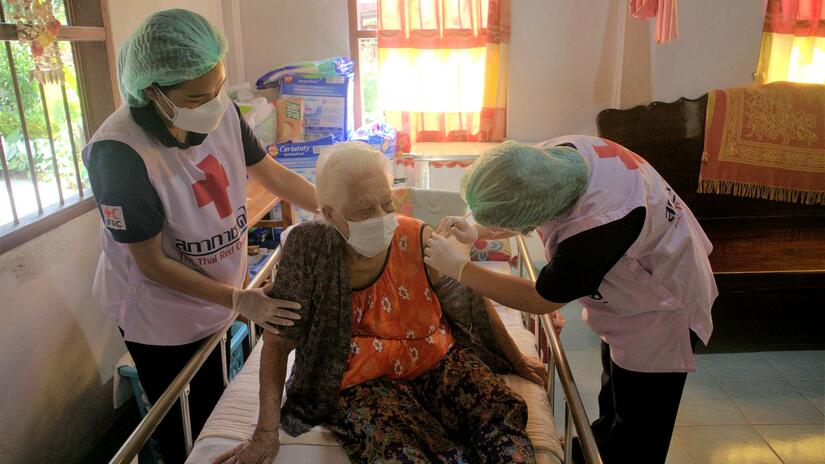Geneva, 12 May 2022 - During the second Global COVID-19 Summit co-hosted by the White House, the International Federation of Red Cross and Red Crescent Societies’ (IFRC) Secretary General Jagan Chapagain underlined the network’s commitment to delivering COVID-19 vaccines, tests and treatments to the most vulnerable and building back stronger health systems.
While many countries have successfully rolled out COVID-19 vaccination campaigns, vaccine coverage remains below 10 per cent in many low-income countries including, Papua New Guinea, Democratic Republic of Congo, Haiti or Madagascar. Low-income countries can also not afford tests and other lifesaving tools such as antiviral drugs or oxygen supplies, leaving millions at risk of contracting the virus and suffering its deadly consequences.
Mr. Chapagain said:
“World leaders must step up and ensure that everyone, everywhere has access to vaccines, tests and treatments. This means targeting those who are most vulnerable, have the greatest needs and are the hardest to reach. This pandemic is still spreading and killing people. It is too soon to drop our guard and give up our global efforts against COVID-19.”
Since the start of the pandemic, National Red Cross and Red Crescent Societies have supported more than 400 million people to access COVID-19 vaccination and provided mental health support to over 13 million people in 152 countries. Because they are part of the very communities they serve, their role is also critical to building trust, informing communities about public health measures and boosting vaccine uptake.
For example, across Asia and the Pacific, millions of volunteers have helped tens of millions of people get vaccinated against COVID-19. Afghanistan has one of the world’s most fragile health systems and has vaccinated only 12% of its population with two doses. The Afghan Red Crescent has been operating a 50-bed hospital dedicated to COVID-19 patients and provided food or cash to more than 165,500 people. More than 1 million people were screened through their Mobile Health Teams and clinics in 2021.
In Namibia where only 16% of the population has been fully vaccinated, the Namibia Red Cross has led a “get vaccinated – kick COVID-19 out of Namibia” road show campaign. Red Cross volunteers walk through the streets in communities around the country, carrying signs, singing songs, and leading chants about vaccination. At COVID-19 vaccination sites, Red Cross volunteers also support registration for vaccination and data entry and provide basic first aid.
During the Summit, Mr. Chapagain expressed IFRC’s support to a pandemic financing mechanism that would allow community actors to access funding to strengthen community health systems and to increase their resilience to future health threats.
Mr. Chapagain said:
“We need to prepare for the next pandemic now. The world wasn’t ready for COVID-19, but we can be for the next pandemic. We must harness the lessons, successes and failures from the response to COVID-19 and build towards a future where communities are equipped to respond to the next health crisis.”
To request an interview or for more information, please contact:
In Washington: Marie Claudet +1 202 999 8689, [email protected]

